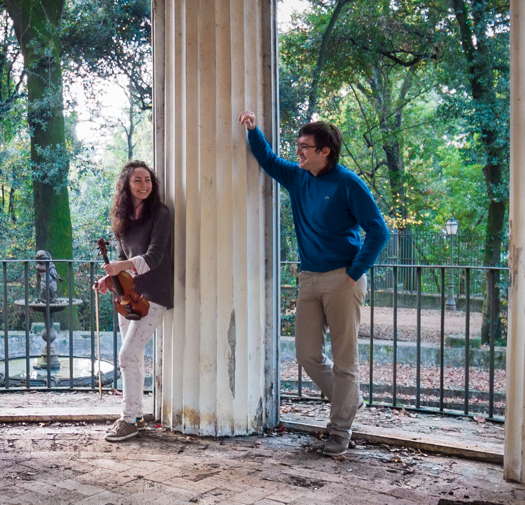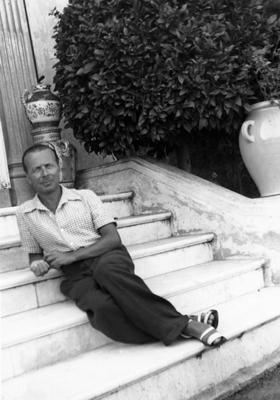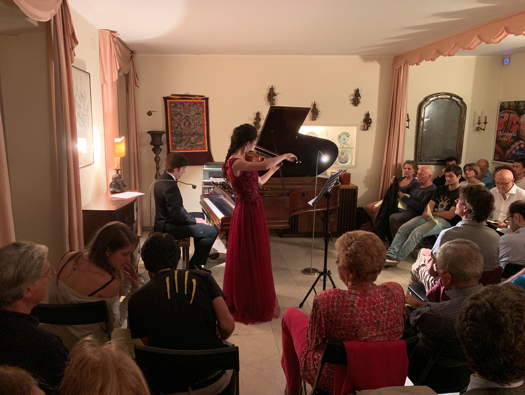 DISCUSSION: John Dante Prevedini leads a discussion about Music and the Visual World, including contributions from Celia Craig, Halida Dinova and Yekaterina Lebedeva.
DISCUSSION: John Dante Prevedini leads a discussion about Music and the Visual World, including contributions from Celia Craig, Halida Dinova and Yekaterina Lebedeva.
 DISCUSSION: What is a work? John Dante Prevedini leads a discussion about The performing artist as co-creator, including contributions from Halida Dinova, Yekaterina Lebedeva, Béla Hartmann, David Arditti and Stephen Francis Vasta.
DISCUSSION: What is a work? John Dante Prevedini leads a discussion about The performing artist as co-creator, including contributions from Halida Dinova, Yekaterina Lebedeva, Béla Hartmann, David Arditti and Stephen Francis Vasta.
- Paul Fu
- Philharmonia
- Sir Charles Mackerras
- Heinrich Schütz
- Wihan Quartet
- Fereydoon Shahbazyan
- Rosemary Braddy
- Tomás Méndez: Cucurrucucú paloma
Hausmusik in the Palatine Hall
by GIUSEPPE PENNISI
The German term Hausmusik indicates the good habit of forming a duo, trio or even a quartet, and playing classical music after a family dinner, especially if friends and/or members of the household are familiar with instruments and instrumental music. In Rome, a place where one can enjoy Hausmusik is in the townhouse where composer and philosopher Giacinto Scelsi lived and worked. It is a four story home, with a music room (for some forty guests) on the fourth floor; a few steps up bring one to a terrace with a stunning view of the Palatine Hill. As reported in the past in Music & Vision Magazine, the little building now hosts the Scelsi Foundation and the archives of Scelsi, Evangelisti and other musicians. To visit it is 'a must' for music lovers coming to Rome.
In the music room, concerts are offered about once per month. There are no tickets, but a small donation of at least ten euros is appreciated to help defray the costs. These are, of course, chamber music concerts. After the concert, drinks and hors d'oeuvres are offered either in the terrace or in the Scelsi Museum on one of the other floors of the townhouse. The program is necessarily modern and especially includes contemporary music. Several young musicians crowd the elegant music room.
On 24 September 2019, I was in the audience for one of these concerts. It was quite a special event because a duo of international standing and reputation, Duo Ardoré, performed five pieces.

Duo Ardoré
Four were written by composers who were in the music room that very night - Stefano Pelagatti, Claudio Perugini, Mauro Porro and Massimo Munari - and the fifth was by the owner of the house, Giacinto Scelsi himself. These works provided a good sample of the 'new Roman school' - musicians not necessarily born in Rome but who live and work in Rome; Scelsi lived a good deal of his life in Rome, where he died in 1988. At the 2007 Salzburg Festival, where a special section was devoted to Scelsi Kontinent, he was aknowledged as the precursor and the head of the 'new Roman school of music'. The common theme of the concert was well summarized in its title: Misteriose Profondità Spaziali (Mysterious Spatial Depths).

Giacinto Scelsi (1905-1988) in 1936
A few words about the performers. Duo Ardoré is an acronym based on the first names of the two artists - Alessandro Viale, the pianist, and Rebecca Raimondi, the violinist - as well as the names of the first two of the seven musical notes: Do (in English, C) and Ré (D). The duo has been based for a few years in London, where Mr Viale still works at the Guildhall School of Music and Drama as well as at Trinity Laban Conservatory. They moved recently to Frankfurt, for better performing and recording opportunities. They specialize not only in modern and contemporary music but also in the Baroque.
The concert started with Pelagatti's Invenzione Concertata (Invention for a Concert). The piece is centred on A by the violin, which starts a very intense dialogue with the piano.

Duo Ardoré performing at Giacinto Scelsi's townhouse on 24 September 2019. Photo © 2019 Gianfranco Carrara
Scelsi's Sonata per violino e piano followed. It was composed in 1934, after the revolutionary Rotativa, but it is not as innovative as most of Scelsi's output. Perhaps, for this reason, it is seldom performed. In its three movements - sostenuto, lento and allegro drammatico - the listener can feel Debussy's influence and colours; at that time, Scelsi was living in Paris. I found the last movement particularly interesting with its sense of drama.
Perugini's Paradoxical Dance is a virtuoso piano piece with a lot of rhythm which enthrals the audience.
Porro's Una ad una strappò le stelle dal cielo (One by One, the Stars were Pulled off the Sky) is a descriptive piece on St Lawrence Night and the legend of the falling stars; the piano and the violin seem to dance in a whirpool of light, and there are extreme sonorities.
The last and final piece - Munari's Ante Caudam - was composed especially for Duo Arboré: short, dense and full of energy.
After the concert, we walked up to the terrace to drink, eat, and primarily to admire the Palatine Hill and the Rome Forum at night under the stars and the moon, as well as glimpses of the son et lumière for the tourists.
It was a grand Hausmusik.
Copyright © 29 September 2019
Giuseppe Pennisi,
Rome, Italy

FURTHER INFORMATION ABOUT GIACINTO SCELSI


